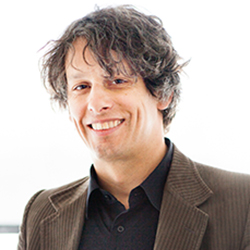Jason Hartline Wins ACM SIGecom Test of Time Award
The award recognizes authors of influential papers at the intersection of economics and computation
Professor Jason Hartline received the Association for Computing Machinery (ACM) SIGecom 2021 Test of Time Award, the association’s annual honor recognizing authors of influential papers at the intersection of economics and computation.
 The paper entitled “Competitive Auctions and Digital Goods” (SODA, 2001) was co-authored by Andrew Goldberg, senior principal scientist at Amazon, and the late Andrew Wright, a former member of the Cisco Critical Infrastructure Assurance Group.
The paper entitled “Competitive Auctions and Digital Goods” (SODA, 2001) was co-authored by Andrew Goldberg, senior principal scientist at Amazon, and the late Andrew Wright, a former member of the Cisco Critical Infrastructure Assurance Group.
Recognized for “initiating a long and fruitful line of work in approximately revenue-optimal auction design in prior free settings,” The team will be presented with the award at the 22nd ACM Conference on Economics and Computation held on July 19-23. The award committee included David Parkes (Harvard University), Larry Samuelson (Yale University), and Eva Tardos (Cornell University).
The number of online marketplaces such as eBay, AirBnB, and Uber have rapidly increased since 2000. These marketplaces combine user behavior and preferences with market mechanisms mediated by technology platforms. The framework from Hartline’s paper and subsequent literature informs how these online marketplaces should be designed to perform well under a wide range of market conditions.
Hartline developed and wrote the paper in the summer of 1999 when he was a second-year PhD student at the University of Washington (UW) and advised by Anna Karlin, Bill and Melinda Gates Chair in Computer Science and Engineering at UW. During a summer internship at InterTrust Technologies’ STAR Lab, a small research lab at a digital rights management startup, he began working with Goldberg and Wright on digital goods and auctions questions.
In the paper, Hartline and co-authors identified a family of research questions at the interface between computer science and economics, presented a framework for analyzing mechanism designs that perform well, and provided methods that were useful for mechanism design questions.
This framework for designing and analyzing mechanisms that work well regardless of participant preferences created a subfield called “prior-free mechanism design,” which was very active between 2000-2010. Since then, the subfield has evolved into “prior-independent mechanism design” and a related field called “sample complexity of mechanism design.” The ACM Conference on Economics and Computation, the main conference for interdisciplinary research at the interface between computer science and economics, publishes papers on these topics annually.
“I think it was super lucky that I found — or more accurately, was found by — the topic of auctions before essentially anyone else in CS was thinking about them,” said Hartline. “I think there is huge value in taking on an odd project in an odd area. You might find what you are meant to do, and it might make a career for you.”
